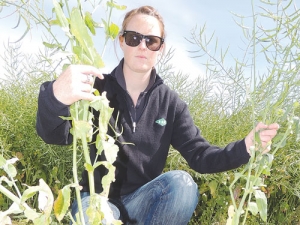Former Beef+Lamb NZ CEO appointed head of Foundation for Arable Research
Former chief executive of Beef+Lamb New Zealand Scott Champion will head the Foundation for Arable Research (FAR) from July.
 FAR’s Jen Linton demonstrates pgr effects on oilseed rape trials at the arable site, Chertsey, late last year. No significant difference was recorded.
FAR’s Jen Linton demonstrates pgr effects on oilseed rape trials at the arable site, Chertsey, late last year. No significant difference was recorded.
FAR cultivar and herbicide trials with resurgent crop oilseed rape promise to help growers hone their agronomy on the resurgent crop.
A much tighter range of yields in cultivar trials shows selections are closing in on types that suit New Zealand, FAR’s Jen Linton told farmers at the Timaru meeting.
At Waimate there was no significant difference between the six hybrids and one conventional cultivar, DK Cabernet, in the trial which averaged 5.04t/ha. Cabernet top yielded at 5.19t/ha.
It was the same story at Fairlie with the conventional topping the 5.52-6.07t/ha yield range and a site mean of 5.8t/ha. “It shows we are picking and choosing the right varieties to grow,” Linton said.
Overall yields were about 2t/ha higher than the previous year when high winds caused severe seed loss prior to harvest.
This year the short cultivar DK Exstorm was the lowest yielding at both sites but Linton said if the plots had been hit by high winds again, “as the name suggests [Exstorm] would have been the best one.”
The headline message from a 10-treatment herbicide trial targeting hairgrass in oilseed rape at St Andrews was to get the first spray on in May. At that timing all treatments gave over 90% control but when application was delayed to July the best control was 55% and the worst only 3%. “There were massive populations [of hairgrass] in some areas.”
Defoliation as a means of plant growth regulation and feed provision continues to be investigated in oilseed rape with this year’s results from trials at Chertsey showing no significant difference in yield between plots defoliated by cutting hard at the green bud stage, given a light mow at yellow bud, or treated chemically with plant growth regulators (pgrs) Cycocel, Folicur or Moddus.
“There was no significant difference but it’s pretty exciting that we could grow 5.5t/ha at the arable site,” said Linton.
On this occasion the feed potential of defoliations was limited. “We only took half a tonne off. In the past we have taken two-and-a-half tonnes [per hectare] off but at the arable site it’s been hard to get the crop that bulky.”
Horticulture New Zealand (HortNZ) has added its perspective to numerous primary sector voices urging the Government to strengthen its draft legislation to replace the Resource Management Act (RMA).
The Commerce Commission has finalised new information disclosure requirements for local councils and water organisations that deliver water supply and wastewater services.
Beef + Lamb NZ (B+LNZ) is calling for significant changes to the Government’s reforms to the Resource Management Act (RMA).
NZPork says the Government needs to strengthen its proposed planning laws to ensure New Zealand's pig farmers can continue to produce pork.
Good news for kiwifruit growers - a record crop with forecast per hectare returns at record levels for all fruit categories for the 2025-26 season.
As guests gathered on what is known as the Speaker's Lawn - a beautifully manicured patch of grass behind the main buildings of Parliament - to mingle and enjoy a lamb chop to celebrate National Lamb Day, the mood was very much upbeat.

OPINION: The proverbial has really hit the fan in Wellington and exposed a glaring example of a double standard in…
OPINION: Dark suited spin doctors exist to, well, spin, and the nice cuddly progressive types at Greenpeace Aotearoa practice this…